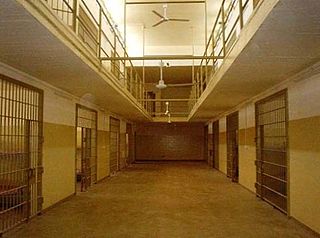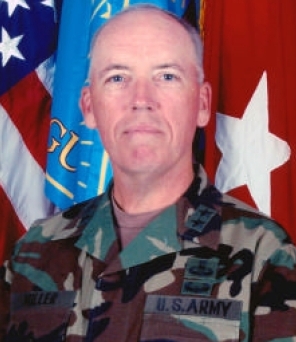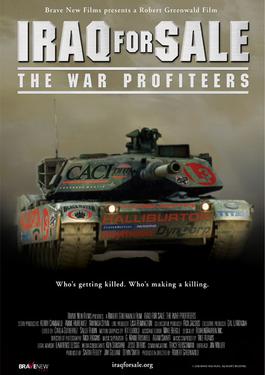Related Research Articles

Abu Ghraib prison was a prison complex in Abu Ghraib, Iraq, located 32 kilometers (20 mi) west of Baghdad. Abu Ghraib prison was opened in the 1950s and served as a maximum-security prison. From the 1970s, the prison was used by Saddam Hussein to hold political prisoners and later the United States to hold Iraqi prisoners. It developed a reputation for torture and extrajudicial killing, and was closed in 2014.

Charles A. Graner Jr. is an American former soldier and corrections officer who was court-martialed for prisoner abuse after the 2003–2004 Abu Ghraib prisoner abuse scandal. Along with other soldiers of his Army Reserve unit, the 372nd Military Police Company, Graner was accused of allowing and inflicting sexual, physical, and psychological abuse on Iraqi detainees in Abu Ghraib prison, a notorious prison in Baghdad during the United States' occupation of Iraq.
Megan Ambuhl is a former United States Army Reserve soldier who was convicted of dereliction of duty for her role in the prisoner abuse that occurred at Abu Ghraib prison, a notorious prison in Baghdad during the United States' occupation of Iraq.

During the early stages of the Iraq War, members of the United States Army and the Central Intelligence Agency committed a series of human rights violations and war crimes against detainees in the Abu Ghraib prison in Iraq. These abuses included physical abuse, sexual humiliation, physical and psychological torture, and rape, as well as the killing of Manadel al-Jamadi and the desecration of his body. The abuses came to public attention with the publication of photographs by CBS News in April 2004, causing shock and outrage and receiving widespread condemnation within the United States and internationally.
About six months after the United States invasion of Iraq of 2003, rumors of Iraq prison abuse scandals started to emerge.

Geoffrey D. Miller is a retired United States Army major general who commanded the US detention facilities at Guantanamo Bay, Cuba, and Iraq. Detention facilities in Iraq under his command included Abu Ghraib prison, Camp Cropper, and Camp Bucca. He is noted for having trained soldiers in using torture, or "enhanced interrogation techniques" in US euphemism, and for carrying out the "First Special Interrogation Plan," signed by the Secretary of Defense, against a Guantanamo detainee.

Michael Ratner was an American attorney. For much of his career, he was president of the Center for Constitutional Rights (CCR), a non-profit human rights litigation organization based in New York City, and president of the European Center for Constitutional and Human Rights (ECCHR) based in Berlin.
Ghost detainee is a term used in the executive branch of the United States government to designate a person held in a detention center, whose identity has been hidden by keeping them unregistered and therefore anonymous. Such uses arose as the Bush administration initiated the War on Terror following the 9/11 attacks of 2001 in the United States. As documented in the 2004 Taguba Report, it was used in the same manner by United States officials and contractors of the Joint Interrogation and Debriefing Center at the Abu Ghraib prison in Iraq in 2003–2004.
Thomas M. Pappas is a former United States Army colonel who is a civilian intelligence officer with the Army's Training and Doctrine Command at Fort Eustis, Virginia.

In 2005, The New York Times obtained a 2,000-page United States Army investigatory report concerning the homicides of two unarmed civilian Afghan prisoners by U.S. military personnel in December 2002 at the Bagram Theater Internment Facility in Bagram, Afghanistan and general treatment of prisoners. The two prisoners, Habibullah and Dilawar, were repeatedly chained to the ceiling and beaten, resulting in their deaths. Military coroners ruled that both the prisoners' deaths were homicides. Autopsies revealed severe trauma to both prisoners' legs, describing the trauma as comparable to being run over by a bus. Seven soldiers were charged in 2005.
Cyrus Kar is an Iranian-born American film director, and vindicated alleged terrorist who was captured by United States forces in Iraq on May 17, 2005, while filming a documentary on the life of Cyrus The Great. On July 10, 2005, he was released from custody after his family sued, accused the U.S. government of violating his civil rights and detaining him after his clearance by the FBI. He has been accused of smuggling washing machine timers for use in improvised explosive devices in a taxi he was riding into Baghdad.
United States Army Captain Carolyn Wood is a military intelligence officer who served in both Afghanistan and Iraq. She was implicated by the Fay Report to have "failed" in several aspects of her command regarding her oversight of interrogators at Abu Ghraib. She was alleged by Amnesty International to be centrally involved in the 2003 Abu Ghraib and 2002 Bagram prisoner abuse cases. Wood is featured in the 2008 Academy award-winning documentary Taxi to the Dark Side.
The Criminal Investigation Task Force (CITF) is an organization created in early 2002 by the United States Department of Defense to conduct investigations of detainees captured in the War on Terrorism. It was envisioned that certain captured individuals would be tried by a military tribunal for war crimes and/or acts of terrorism.
Steven L. Jordan is a former United States Army Reserve officer. Jordan volunteered to return to active duty to support the war in Iraq, and as a civil affairs officer with a background in military intelligence, was made the director of the Joint Interrogation Debriefing Center at Abu Ghraib prison.

Iraq for Sale: The War Profiteers is a 2006 documentary film made by Robert Greenwald and Brave New Films. Produced while the Iraq War was in full swing, the film deals with the alleged war profiteering and negligence of private contractors and consultants who went to Iraq as part of the US war effort.
Abdul Wahid was a citizen of Afghanistan whose autopsy was held in the United States's Bagram Theater detention facility. He was beaten to death on November 6, 2003.
Emad Khudhayir Shahuth al-Janabi was an Iraqi blacksmith detained in Abu Ghraib prison where he alleges he was abused by American military personnel and defense contractors.
A number of incidents stemming from the September 11 attacks have raised questions about legality.
Unconstitutional: The War on Our Civil Liberties is an American 2004 political documentary about the legal problems with the PATRIOT Act. It posits that the law, hastily passed in the wake of the 9/11 attacks, is used to justify a variety of abuses of civil rights that are guaranteed by the US Constitution.
Susan L. Burke is an American lawyer noted for her work to reform the military system of prosecuting rape and assault and in representing plaintiffs suing the American military or military contractors, such as the Abtan v. Blackwater case. She represented former detainees of Abu Ghraib prison in a suit against interrogators and translators from CACI and Titan Corp. who were tasked with obtaining military intelligence from them during their detention. Her work was featured in the documentaries The Invisible War and Ghosts of Abu Ghraib. In 2015, the National Law Journal named Burke one of the top 75 female attorneys in the nation.
References
- 1 2 Amanda L. Aranowski (January 23, 2008). "Lawyer Profile". Michigan Lawyers Weekly. Archived from the original on 2008-01-16. Retrieved 2008-01-24.
- ↑ Marie Beaudette (June 28, 2008). "Standing at the Floodgates". Legal Times. Retrieved 2008-01-24.
- ↑ "Michigan Super Lawyers" . Retrieved 2008-01-23.